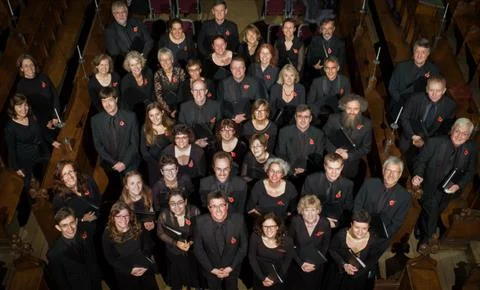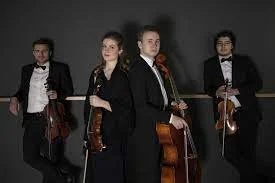BEETHOVEN, MOZART & DOVE AT TRINITY COLLEGE CHAPEL
Ludwig von Beethoven as a concert opener? A rare event to find the supreme maestro of musical composition as a warm-up - and only exceptional circumstances can explain it. The Fairhaven Singers more than justified their unorthodox decision as the evening of music at Trinity progressed. It was to lead up to a breathtaking first performance for a piece commissioned especially for them.
The Fairhavens are a group so confident and talented they function as a professional chamber ensemble with performances at such prestige places as The Snape Maltings for the Aldeburgh Festival and appearances on Radio 2, 3 and 4 as well as Classic FM. And they tour. Portugal Germany and Spain have all hosted this prodigious chamber choir. Yet their most outstanding diversion from the norm is a passion for the new and the daring. The Fairhaven Singers have already worked closely with contemporary composers and commissioned pieces from them. The concert in Trinity Chapel was this time, a premier of a piece by Jonathan Dove, with the composer present for its debut.
Ralph Woodward’s East Anglian Chamber Orchestra were the brilliant – and often boisterous – partners for the evening. Equally skilled as their vocal partners they too have a professional feel, (unsurprising as they perform in Ely Cathedral, King’s College as the Chapel and the Saffron Hall). Their first violins were poised for a demanding evening of playing, as was the entire orchestra. They were in for a taxing time but never let the audience feel the pressure. Conductor Ralph Woodward has a dashing style and an energy reminiscent of Leonard Bernstein. He also has the vital sense of drama this music increasingly required right from the start.
Beethoven’s Mass in C was still staggeringly brilliant. So used are we to his symphonies concertos and sonatas it’s a strange surprise to hear the great man’s version of the time honoured structure of the Mass. In his day it raised eyebrows. Beethoven was known as an atheist – an epithet thrown out by Haydn – but with his Catholic upbringing, he must have found the Mass a tempting challenge. In fact he took a form so familiar and revolutionized it entirely.
Written for the ubiquitous Prince Esterhazy as a celebration of his wife’s name day, the Mass - unsurprisingly - did not go down well at all. “What have you done this time?” questioned his puzzled patron whilst the shocked Kapellmeister Hummel was appalled, describing it in his diary as “ unbearably ridiculous and vile”.
The Fairhaven singers rose to vindicate the composer with a vigorous, probably draining, version of this titanic work. It is a heroic - and brilliant - piece of music written when Beethoven was at his musical zenith. The Gloria is almost a war-cry of harmonic defiance, a protest possibly against the problems beginning to encroach on the composer but interpreted by the Fairhavens in a controlled sonority both arresting, and in the true sense of the word, awesome. By contrast the Fairhavens were more than capable of dialing down the shock blasts of the Gloria with a Sanctus, which managed to sonically whisper the reverence of the prayerful piece. The poignant Agnus Dei followed, where ‘Give us Peace’ is the refrain, and the upbeat reprise was rendered with heartfelt intensity by the company. Peace is what we pray for in any era and in Beethoven’s tumultuous times more fervently than ever.
The real surprise of the evening arrived with the first bars of Jonathan Dove’s much anticipated (and newly ordered) composition for the Fairhaven singers ‘Sappho Songs’, seductive and subtle lines translated by Alastair Middleton beginning with
‘From Heaven to here
Down
Your Orchard
Altars misty with incense
Cool water babbles through apple trees
Dappled with roses’
Not hard to hear Jonathan Dove’s theatre tropes in the work he has crafted for these haunting stanzas. His music is a time machine poised to drift the listener into the millennia of the Ancient Greeks. With deft musical skill he takes us to the honeyed world of the poetess Sappho on the magical island of Lesbos where she practiced her art. Rapidly though the mood changes in the next stanza - only a three line fragment - ‘ You burn me”, where Dove reaches into the realms of abandon as the singers project a loud primal shout of erotic triumph – or was it pain? Or both? The images conjured are arresting and the music is emotional as well as nuanced. Here is an exciting evocation of the mystique of ancient days, lost mostly to our insight, but brought alive by the rich natural sounds of the extraordinary ensemble – and the originality of Jonathan Dove’s powerful command of composition.
The Fairhaven Singers will perform next at Queens’ College Chapel, Cambridge on Saturday, July 13th, 2019 at 4:30pm







